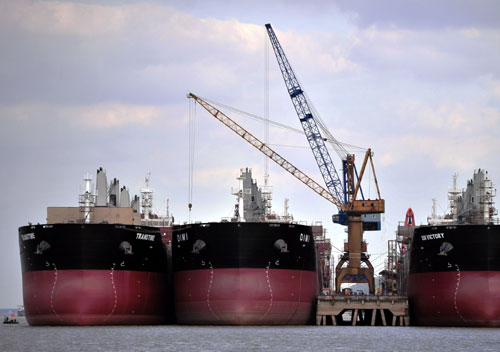Shipbuilders to ride wave
Updated: 2011-11-30 09:27
By Zhou Siyu and Yu Ran (China Daily)
|
|||||||||||
MIIT official says the industry will soon undergo major consolidation
BEIJING / SHANGHAI - Pressed by the difficult market conditions, China plans to enhance the competitiveness of its shipbuilding industry by developing a handful of major players, said Guo Yanyan, a senior official at the Ministry of Industry and Information Technology (MIIT).
|
 |
|
As of 2010, the volume of completed shipbuilding orders in China accounted for 43 percent of the global total.[Photo/China Daily] |
The government will further consolidate the sector by encouraging mergers and acquisitions and reorganization among Chinese shipbuilders, said Guo, at the Senior Maritime Forum of the 2011 International Maritime Conference in Shanghai on Tuesday.
"We will strive to foster more than five Chinese shipbuilders so they will be among the world's top 10 (in terms of production capacity) by the end of 2015," he said. According to the plan, industrial consolidation will see China's 10 biggest shipbuilders account for more than 70 percent of the country's domestic shipbuilding production. Small and medium-sized companies will be encouraged to develop specialized shipbuilding techniques, Guo added.
The weak recovery of the global economy has resulted in a depressed market for shipbuilders this year. The number of orders for new vessels at Chinese shipyards - particularly for tankers and bulk-carriers - has been much lower than in 2010, said Zhang Shengkun, the president of the Shanghai Society of Naval Architects and Marine Engineers.
In 2010, China replaced South Korea as the world's top shipbuilder and the volume of completed shipbuilding orders accounted for 43 percent of the global total. Meanwhile, orders for new ships accounted for 5 percent and orders in hand were 41 percent.
So far this year, orders for new ships made in South Korea have outstripped China by 17 percent, Zhang said.
"With their technological advantages, South Korean shipbuilders can manufacture vessels with more added-value. Chinese shipbuilders have not paid enough attention to their product structure and are facing a serious problem of overcapacity in the market," said Zhang at the forum.
Guo said Chinese shipbuilders should strive to develop their technology to meet demand in the international market.
"Most Chinese shipbuilders produce bulk-cargo ships as their major product. To tap into the global market, it is time to develop the technologies to make vessels with more added-value, such as container vessels, liquefied-natural-gas carriers and drilling ships," said Guo.
Another emerging market for Chinese shipbuilders is the oceanographic engineering equipment industry, said Guo, citing the government's 12th Five-Year Plan (2011-2015).
"China's sales revenue from oceanographic engineering equipment is expected to exceed 200 billion yuan ($31 billion) this year, and the country's market share for equipment used in the detection of oceanic oil and gas is targeted to reach 20 percent in five year's time," said Guo.
In 2010, China's accomplished shipbuilding output exceeded a total deadweight tonnage of 60 million tons for the first time, a fivefold increase from 2005. By the end of the third quarter of this year, the accomplished shipbuilding output exceeded a total deadweight tonnage of 51 million tons.








